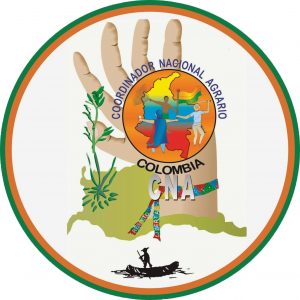The Latin American Coordination of Rural Organizations (CLOC-LVC) denounced the “arbitrary detention” by the Attorney General’s Office of Colombia of three well-known leaders of the National Agricultural Coordination (CNA) on December 15.
They are Adelso Gallo, a recognized peasant and social leader from the central-eastern region of Colombia, a member of the National Board of the CNA, detained in the city of Villavicencio; Teófilo Acuña, peasant leader and spokesman for the organizational process that brings together peasant communities, landless, fishermen, agrominers and other social organizations in Bolívar, Cesar, Santanderes and Magdalena, with the CNA for more than 20 years; and Robert Daza, peasant leader from the north of Nariño, former president of the CNA, promoter of the Agro-Food Peasant Territories at the national level. The three are also leaders of the People’s Congress, a Colombian social movement that works for the construction of Popular Power.
They have been spokesmen in the dialogue with the Government at the local, regional and national levels, and within the framework of Decree 870 of 2016 between the Ethnic and Popular Peasant Agricultural Summit and the national Government.
The arrests occurred in a year in which threats against defenders of the peoples and territories [1], crimes against social leaders [2], and massacres [3] in Colombia have intensified, as a result of the failure of Ivan Duque’s Government to comply with the Peace Accords signed four years ago between the State and the FARC [4].
CNA, Vía Campesina and dozens of social and environmental organizations are following up on these arrests and are demanding a stop of the “judicial setups and the imprisonment of leaders”.
Yhoana Milena Castaño, vice president of the National Agricultural Coordination, analyzed with RWR these detentions within a situation of systematic violence in Colombia:
“There are many types of violence together. We came from a strong organizational process and the pandemic brought more violence because many inequalities are deepening, especially in our rural communities. A structural crisis of the system is evident, especially in health, education, food, not for a lack of production but due to the issue of access and the increase of packages that come with food from other places; thus, food that our peasants produce is lost, it has no value. Apart from that, the CNA has had very painful losses this year, such as the murder of Marco Rivadeneira [2], many leaders were assassinated in our work areas; and now, the capture of these three leaders who are very relevant to the process.”
Magalí Pino, National Secretary for Human Rights of the CNA, pointed out that these arrests are part of the Government’s persecution of “comrades with a high recognition in their territories for the battles they have fought there defending life, against transnational corporations.”
“The Prosecutor’s Office and the Police deprive colleagues of their freedom to prevent that career they have been doing in the exercise of defending the territories,” accusing them of unfounded charges and making “judicial setups for the capture.” Pino stressed that “when a leader is assassinated, a whole process is broken; and those who are not murdered are imprisoned.”
“We call these arbitrary arrests ‘judicial false positives’. They seek to delegitimize the demands of movements and organizations, subjecting leaders to long periods of detention, and forcing their families and grassroots processes to undertake exhausting, tortuous and costly judicial processes, presenting those who defend life, peace, water and territory as criminals,” Magalí Pino explained.
That is why the campaign “Being a social leader is not a crime” is being relaunched even more strongly, and they will denounce these arrests at the international level “so that the international community knows about this genocide.”
The defender also denounced that Teófilo’s life is particularly at risk in the deprivation of liberty, since he suffers from serious health problems and does not have the required medication at his disposal.
“Although we eventually prove his innocence, as it has happened in other cases, the damage caused by the deprivation of liberty is irreparable for the life of the defender and for the organizational process,” Pino added.
For her part, Yhoana Milena Castaño reasserted: “We’re going to continue the fight, building up hope; because, at the end of the day, we’re here for the defense of rights, for the recovery of dignity.”
“The current Government [of Colombia] hasn’t had the political will to properly execute and develop the points agreed upon in the Peace Agreement, and today they have a large part of the country once again immersed in violence by illegal groups and paramilitaries in the territory. These actions are added to the increase in cases of persecution against the peasant organization, the displacement to communities, and the petty accusation by judicial entities against social leaders of crimes that end up being more of what are called judicial false positives”, CLOC said in a statement [5] on December 16.
Expressions of solidarity with persecuted and detained peasants
CLOC-Vía Campesina expressed their solidarity with CNA-Colombia and a “deep rejection of the criminalization actions towards the Colombian social and popular movement”; they demand that the authorities in charge of protecting human rights address these events, and urge human rights organizations and popular organizations to remain “vigilant and alert to the critical human rights situation that our peasant movements are facing at the international level.”
The Friends of the Earth International (FoEI) federation also expressed their solidarity with the detained leaders and concern “about the systematic violence against popular movements, organizations and processes, and against all those political subjects who defend the rights of the peoples, their human rights and territories in Colombia.”
“We once again make an urgent call to the international community, to organizations, movements and social processes around the world, to add their voices of complaint and to keep a strict monitoring of the development of these events,” they said in a statement issued through the Internationalist Solidarity System of FoEI [6].
